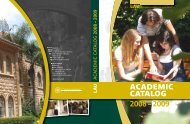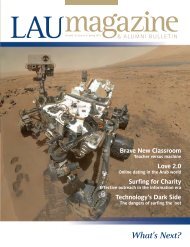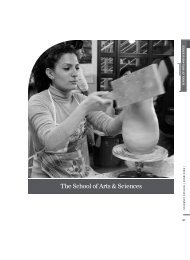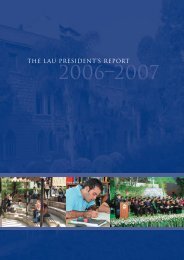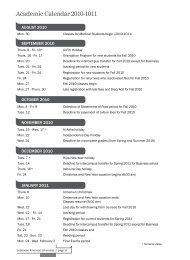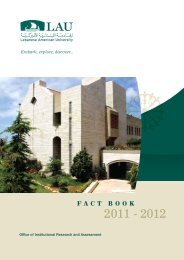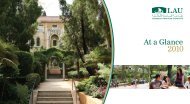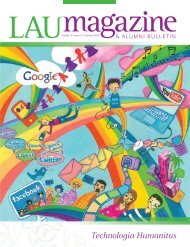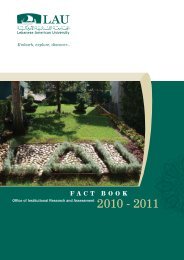academic-catalog2011.. - LAU Publications - Lebanese American ...
academic-catalog2011.. - LAU Publications - Lebanese American ...
academic-catalog2011.. - LAU Publications - Lebanese American ...
Create successful ePaper yourself
Turn your PDF publications into a flip-book with our unique Google optimized e-Paper software.
Department of Humanities<br />
discussed as are the achievements of Ernesto<br />
Che Guevara and Fidel Castro. Church-state<br />
relations, whether with right-wing authoritarian<br />
regimes or communist ones, are chronicled.<br />
The narrative ends with the 1982 Falklands<br />
War between Britain and Argentina.<br />
HST336 History of Africa [3 – 0]<br />
Africa as the home of the oldest known<br />
human settlements (“Lucy” in East Africa) saw<br />
Phoenician, Greek, and Roman colonies in<br />
Carthage and along the Barbary coast of North<br />
Africa. After 430 AD the Vandals crossed into<br />
North Africa and occupied Hippo, the bishopric<br />
of St. Augustine. The course then surveys<br />
the Byzantine, Muslim, Berber, Ottoman, and<br />
European periods of political and colonial<br />
control in the north. In Sub-Saharan Africa<br />
Dutch settlers arrived in 1650 to the Cape and<br />
clashed with the Bantus and Zulus. In the 19th<br />
century European exploration of the Congo<br />
and Upper Nile river basins took place and<br />
the careers of Stanley and David Livingstone<br />
are discussed. British-French colonial rivalry<br />
throughout the continent culminating in<br />
the late 19th century “Scramble for Africa”<br />
is closely analyzed. British adventures in<br />
Sudan, the death of Gordon at the hands of<br />
the Mahdi, and the Fashoda incident between<br />
Kitchener and Marchand are treated. French<br />
colonization of Algeria starting in 1830 and the<br />
exploits of British imperialist Cecil Rhodes are<br />
also covered. Belgian Congo, Italian Ethiopia<br />
and Libya, and a scattered German presence<br />
particularly in South-West Africa (Namibia)<br />
are also a part of the narrative. The 1899-<br />
1902 Boer War between the Afrikaans and<br />
the British is analyzed as an important turningpoint.<br />
Other themes include the slave trade in<br />
Zanzibar, the Cape to Cairo railway, and African<br />
nationalism leading to decolonization and<br />
independence after World War II.<br />
HST340 Topics in the History of Ideas [3 – 0]<br />
This course aims to offer students a glimpse<br />
into the exciting world of intellectual history.<br />
The intricate thematic interplay between<br />
history, philosophy, theology, literature, and<br />
the arts in any given period comprises the<br />
subject matter for this course. Cross sections<br />
of particular ages like for instance Victorian<br />
England, or nineteenth century Russia, or<br />
Renaissance Italy are treated as to the complex<br />
interconnections between a host of prevailing<br />
ideas and their embodiment in specific<br />
philosophical, literary, religious, and other<br />
forms of human creative output. The objective<br />
of the course is to immerse students in the<br />
unique intellectual tenor of an age and provide<br />
them with a firsthand feel for any peculiar<br />
intellectual signature it might manifest.<br />
HST341 Topics in the History of Science [3 – 0]<br />
This course can provide students with a<br />
general overview of scientific progress<br />
throughout human history, or it can choose<br />
to limit the period covered to a shorter and<br />
more coherent span. Possible examples might<br />
include the history of Arabic science, science<br />
during the Renaissance, developments in<br />
physics since Newton, the rise of modern<br />
science, and others. The course can also<br />
concentrate on historical developments within<br />
a specific domain of the natural sciences and<br />
confined to a designated period. Examples<br />
include the history of astronomy, history of<br />
chemistry, history of medicine, history of<br />
evolutionary biology, history of physics, history<br />
of mathematics, and so on.<br />
HST342 Topics in the History of Religion [3 – 0]<br />
This course can concentrate on a specific<br />
world religion and trace its development<br />
over time, or it can follow the comparative<br />
approach with respect to two or more religions,<br />
or, alternatively, it can choose a religious<br />
theme such as mysticism, for example, and<br />
follow its unfolding threads in one or more<br />
religious tradition. Obversely, the course<br />
can decide to focus on a history of atheism.<br />
Whichever approach is chosen there have to<br />
be a couple of introductory lectures that define<br />
the religious animus, briefly survey its earliest<br />
manifestations in human history, and then<br />
zero in on the specific topic at hand. The major<br />
world religions usually provide the subject<br />
matter for various permutations of this course:<br />
Judaism, Christianity, Islam, Mormonism,<br />
Buddhism, Hinduism, Confucianism, Shinto,<br />
Taoism, Sikhism, and varieties of animism.<br />
HST343 Topics in Economic History [3 – 0]<br />
This course surveys the main developments in<br />
economic theory during the modern period. It<br />
begins with an introductory background about<br />
the medieval guilds and crafts and the feudal<br />
agrarian-based economies of the early modern<br />
period. Then it covers systematically as major<br />
figures the contributions of Adam Smith, David<br />
Ricardo, T. R. Malthus, J. M. Keynes, M. Friedman,<br />
and J. K. Galbraith. The differing evolutions<br />
of free-enterprise and command economies,<br />
and how they manifested themselves in<br />
capitalism and socialism, are investigated in<br />
some detail. The intricate interplay between<br />
the often antagonistic forces of freedom and<br />
<strong>Lebanese</strong> <strong>American</strong> University | page 160



